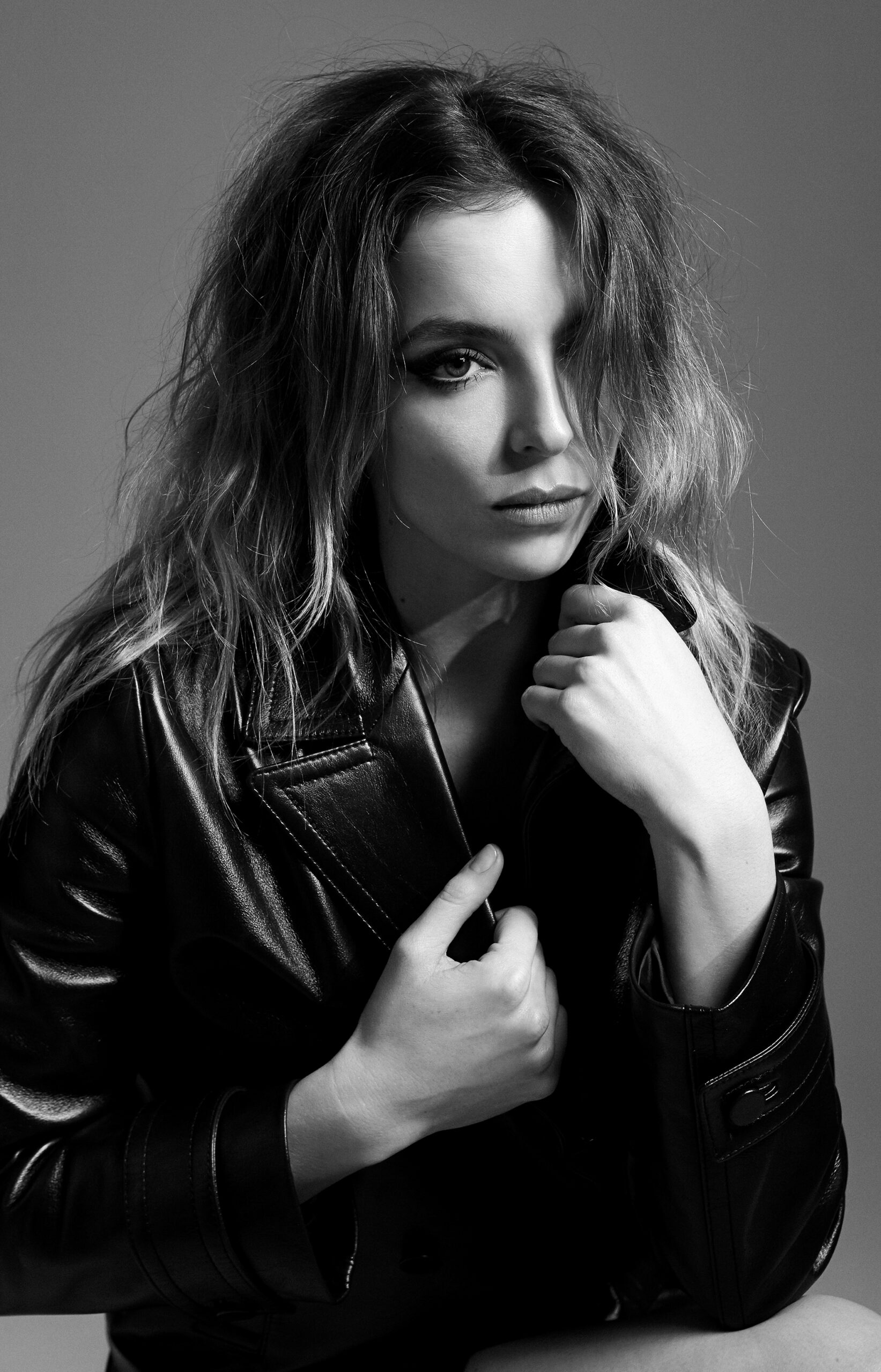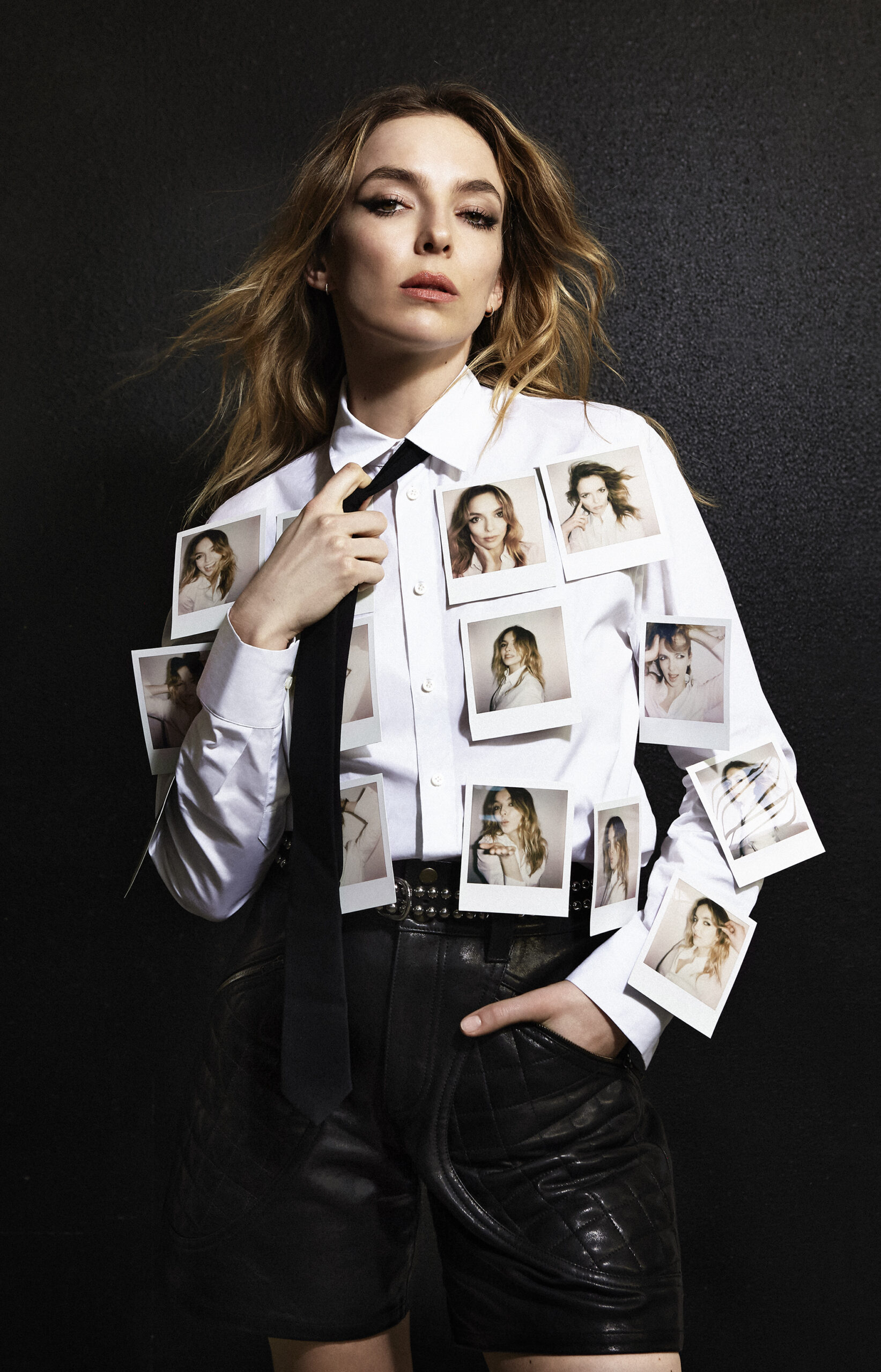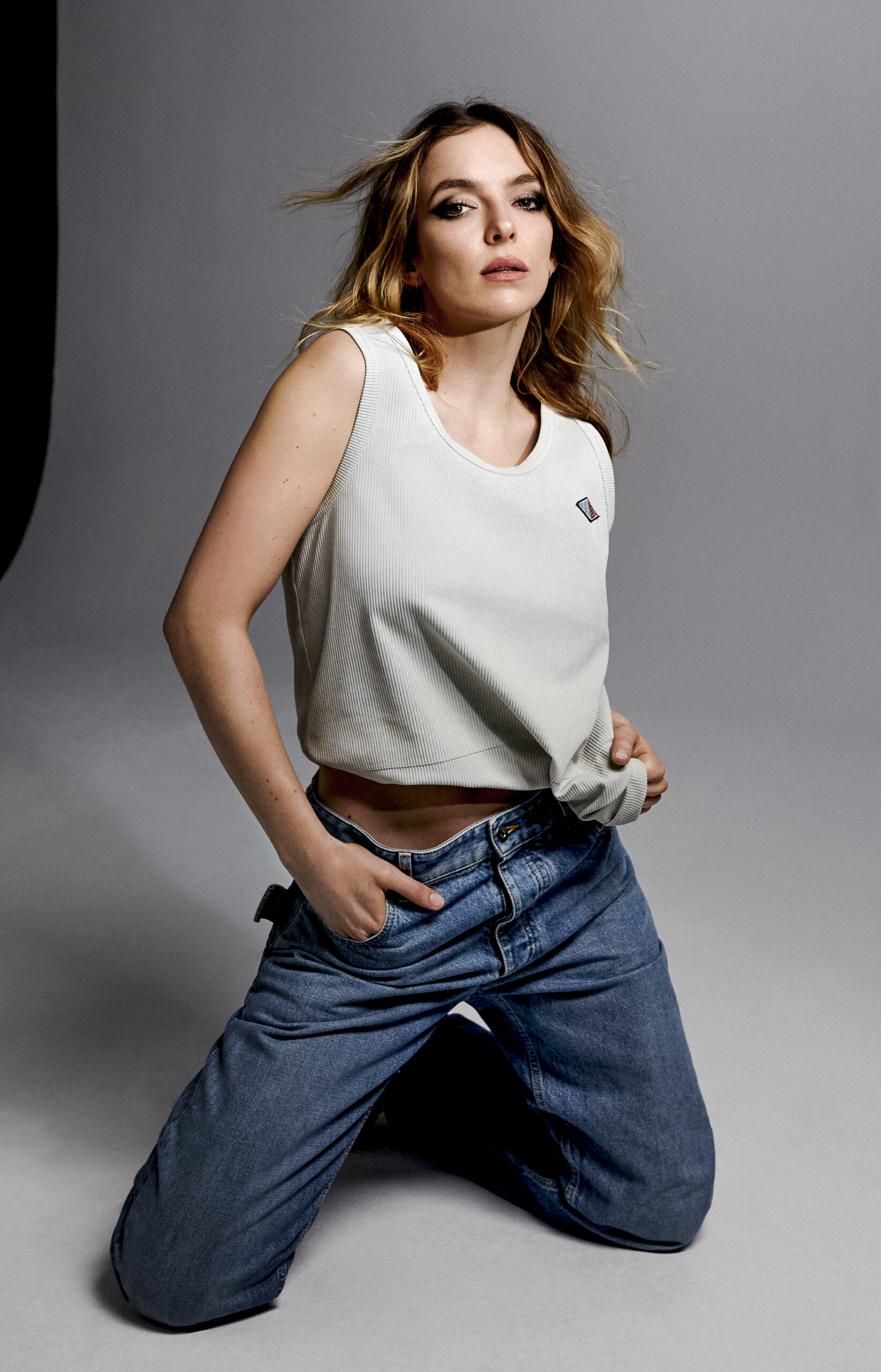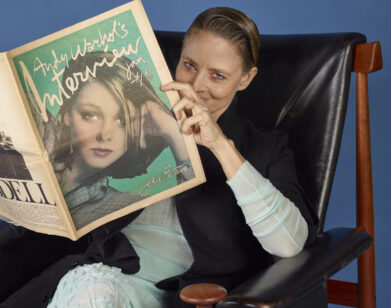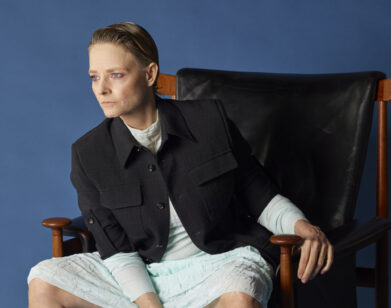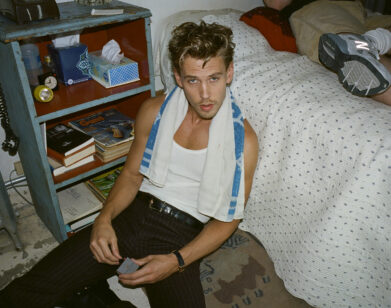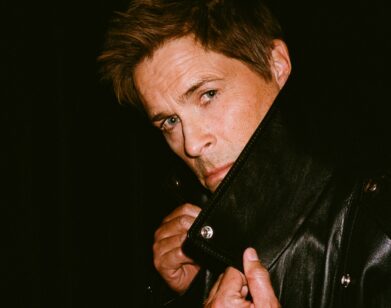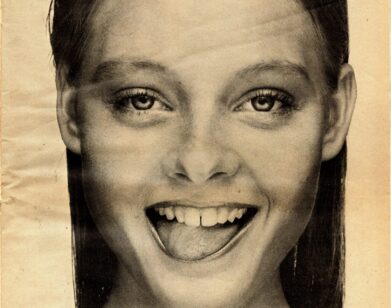JODIE
“Oh, Jodie”: When Jodie Comer Met Jodie Foster
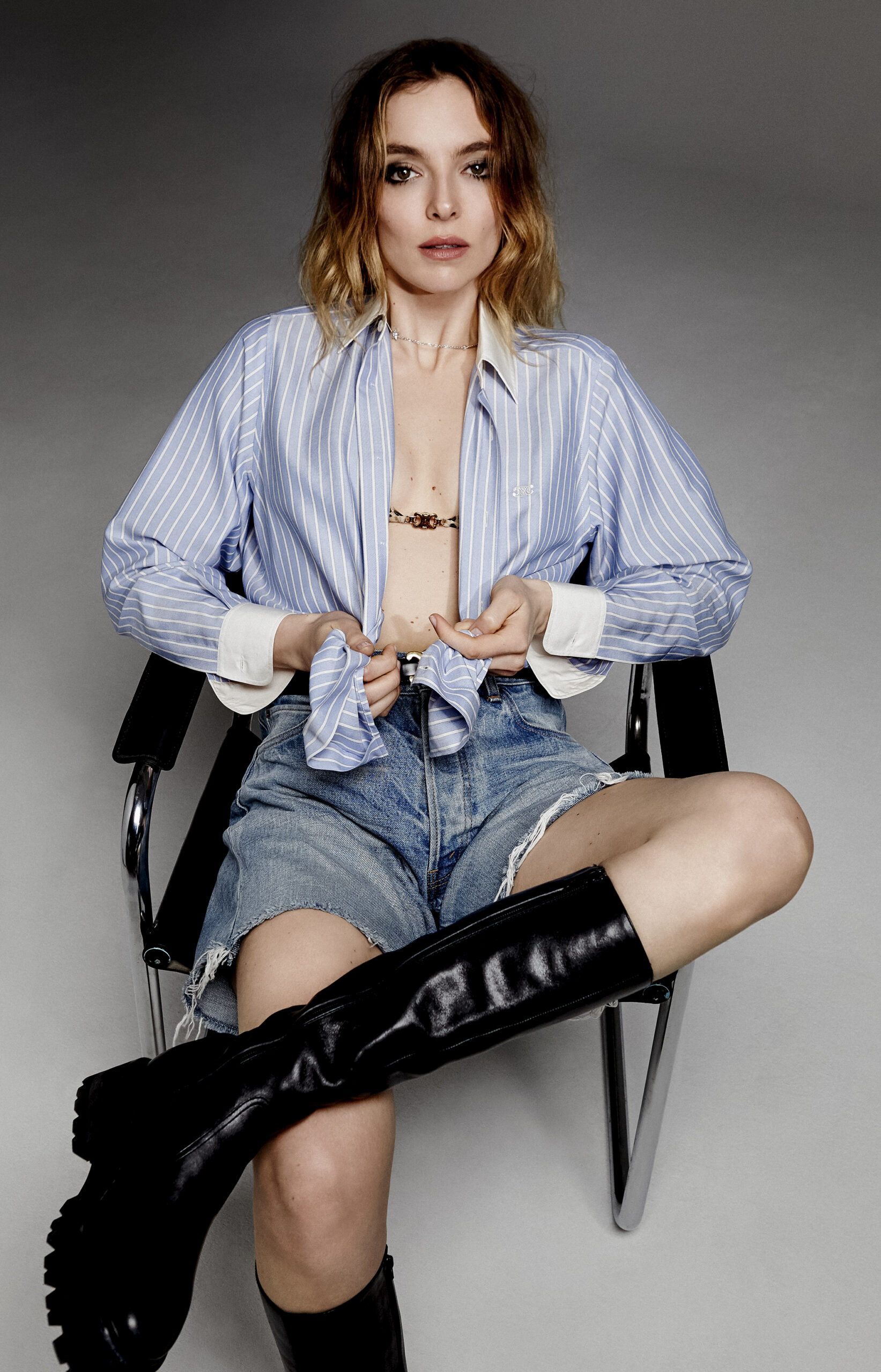
Jodie Comer wears Shirt, Bikini Top, Shorts, Belt, and Shoes Celine by Hedi Slimane. Necklace Chanel Fine Jewelry.
In The Bikeriders, a movie pumped up with ostentatious displays of masculinity, it’s Jodie Comer who steals the show. As Kathy, wife to Austin Butler’s character Benny, the Liverpool native transforms into a pugnacious Midwesterner who brings pathos and vulnerability to the real-life story about a ’60s-era motorcycle club and the men who’d die for it. It’s further proof that the former Killing Eve star is an actor without limits. One person amazed by Comer’s skills is Jodie Foster, who got on a call with her name-twin to talk about emotional triggers, film-set politics, and theatrical trauma.
———
FRIDAY 1 PM APRIL 12, 2024 LONDON
JODIE COMER: Hi Jodie, how’s it going?
JODIE FOSTER: Good, Jodie! I’m so excited.
COMER: Thank you for taking the time to do this. I’m so appreciative.
FOSTER: I got to see The Bikeriders last night, so that was fun.
COMER: Oh, brilliant. So it’s fresh?
FOSTER: Totally fresh. We’ll get into that, but first and most importantly, how did your mom come up with your name? I need to know.
COMER: [Laughs] My mom said that Jodie was always clear to her. If I was going to be a boy, I’d be Kieran, but I ended up being a girl.
FOSTER: The spelling is really uncommon. I think my mom decided she invented the spelling. She said if you put an “e” at the end, it would be the girl’s version.
COMER: It’s true. I haven’t met a lot of Jodies.
FOSTER: I really loved watching The Bikeriders, and it amazes me that you’re able to transform so completely. I don’t know how you do it!
COMER: Thank you. I had an initial conversation with Jeff [Nichols, the director] on Zoom, and he sent the script over, and I was aware that it was based on a book of photographs by Danny Lyon. There were a couple of images of this woman Kathy, and then he was like, “Just so you know, I have 30 minutes of audio of her.” I was like, “Why is this not in my inbox?” It was in that moment, listening to the clip, where I felt like I had an insight as to who this woman was. I could hear the way she carried herself through the way she spoke, and that ignited my imagination.
FOSTER: I don’t want to read into the patterns of your work, but because I’m so old, I’m able to look back on roles that I chose and say, “Now I see why I did that.” It occurred to me as I was looking through your stuff, between The Last Duel, Prima Facie, and even Free Guy, that you’ve told stories about men’s toxicity, and how the women were dramatically affected by that and having their own identities, and possibly by virtue of being close to them, surviving it.
COMER: I think you’re right. I’m realizing that I have a revelation after I’ve finished a job of becoming aware of what it gifted me on a personal level, or maybe something I was wanting to unearth within myself, that I mightn’t have been super conscious of. The beauty of those characters is that they are—I don’t know, I hate that term “strong female character.” What I enjoyed about them was, they had strength, but they were also given space to be vulnerable. But what ultimately connected me to those roles is, they trigger an emotion in me. They rile me up.
FOSTER: Hopefully you get to the end of the movie or show and you say, “Because I went through this, somehow I’m a fuller or better person. And hopefully by refraction, the people that explore this thing with me, the audience members, maybe they get to be better people too.” I guess that’s what the hope is.
COMER: Yeah.
FOSTER: Prima Facie was such an extraordinary experience. I’ve never gone through something like that in the theater before. I was so bowled over, and the way you were able to use this idea of document, or lawyerly facts, to construct a reality of something that happened to you that is unjust, unexplainable, and entirely emotional, was so beautiful. And then I looked it up and realized that you hadn’t really done theater before.
COMER: I’d done theater once when I was 16. I’d found that because I hadn’t been to drama school, that always seemed to be a hindrance. I also had that insecurity within myself, and was thinking, “There’s a wealth of things that I don’t understand.” But I was very fortunate that when Prima Facie came to me, it was with a team of people who didn’t see that as any sort of hindrance. I remember vividly when I met Justin Martin, our director, he was like, “If you need a dialect lesson, we’ll do that. If you need movement, we’ll do that. You’re good.”
FOSTER: You must’ve been so scared.
COMER: Oh, I was terrified. [Laughs] There were a handful of times when I went onstage where I was fizzing and ready, and then out of the other hundred-and-whatever shows, it was sheer terror.
FOSTER: I would’ve been terrified. I’ve never really done theater. I did plays in college and high school. I was scared that there was some mysterious thing that I didn’t understand. And also, because I’d had so much experience in front of the camera, there was something about theater that felt insufficient, where I was like, “You mean the audience can look wherever they want?”
COMER: [Laughs] I’ll never forget, we were in the rehearsal room, and the director pulled me off and was like, “Act on the line.” I was like, “What do you mean?” He’s like, “You’re given the line and then you are evoking your emotion,” because it’s true. You get used to being on a set and you’re like, “Okay, the camera is so close, or they’re on a track. There’s a moment there, a breath here.” Whereas with the play, it was just the pace and the musicality of it, and I was doing a lot of dramatic pauses, and Justin was like, “Act on the line,” and I was like, “Wow, act on the line. Okay.” It was a lightbulb moment.
FOSTER: Right. You’re from Liverpool, right?
COMER: Yes.
FOSTER: Do you still live there?
COMER: I’m in London now, but I go back a lot.
FOSTER: I love it. Your family’s still there?
COMER: Yeah, everyone’s still there.
FOSTER: I read that you can sing and dance as well.
COMER: [Laughs] I try.
FOSTER: That’s amazing. I’m like, What can’t you do?”
COMER: Again, singing terrifies me. I know I can do it, but I am by no means confident. I’d love to do something that involves those two things, because I know that I’m going to have to go away, really hone a skill, or commit to something in a way that I maybe haven’t before.
FOSTER: That’s a dream of mine, where you have to learn to play violin, or speak Italian, or throw a javelin, and you have to go through six months where you do nothing but learn some weird things, so that you look excellent at it.
COMER: I always find I’m like, “Why is it I will commit this time when I’m playing another person, but I could go and learn violin tomorrow, and I still haven’t quite made it there yet.”
FOSTER: That’s what I did on a recent movie, where I was like, “I’m going to be buff,” and someone was like, “Can’t you just go to the gym on your own?” I’m like, “No, I won’t do it.”
COMER: [Laughs] “I need someone to shout at me.”
FOSTER: Was Kathy in The Bikeriders the first real person that you’d played? Oh, no. The Last Duel, I guess.
COMER: Yeah, but this was the first time I had some real character references, and then there’s the beauty of, you have three photographs, and you’re just analyzing them. I love that she was always extravagantly made up, her jeans were always a little bit ill-fitted, and she always stood with her legs out and her toes pointed out, and her hair was messy as if the kid’s fingers had been in it. All these little indicators gave me a feeling of who she might’ve been, against everyone else looking so seamless.
FOSTER: And that’s part of it, too. A lot of what those men were doing was posing as, “This is what a tough guy looks like.”
COMER: Absolutely.
FOSTER: And her attraction to that, in some ways, seemed almost like an attraction to the theatricality of that.
COMER: You just reminded me about their inability to speak their truth and communicate, and yet they’re all really desperate for this sense of belonging. But Kathy gives Johnny, who’s played by Tom Hardy, this opportunity to speak when they’re sitting outside on the door- step, and he’s still not able to.
FOSTER: That was such a beautiful moment, which is interesting, because her relationship with Austin Butler’s character, Benny, is so much about that initial attraction. I’m sure that you and Austin had to be close on that, because you had so much to figure out together. I’m sure he had his own questions about his character, because he was so unknowable.
COMER: That was very true of Benny in real life. When I watched the film, I felt that sense of him being pulled in all directions, trying not to be pinned down, especially from Kathy’s point of view. I was like, “It’s such an ensemble piece,” and I felt like I cared about where each of them ended up.
FOSTER: Now that I’m older, what I really love is supporting other people, and I love watching them be their best selves.
COMER: Yeah.
FOSTER: I’ve always made movies by myself, where it was just about my character, and I didn’t have to deal with the other actors. As I’ve gotten older, I’ve come to understand that was selfish of me, jealously guarding something that I didn’t want to share. Now I’m learning to enter in and say, “How are we together and dynamic?” Instead of it all being about me. It has been so interesting, because now I meet all these actors that do everything differently.
COMER: Yeah.
FOSTER: And I don’t have the same process as a lot of people, because I can do crossword puzzles, or make jokes, or be eating something, and then somebody says, “Action,” and I’m popping in. I’ve learned not to bug other actors before they start.
COMER: I’m like you. I definitely like to break when it’s, “Cut,” and jump back in when it’s absolutely needed, and like you say, make sure to give someone space when they have a more difficult scene ahead. Are you happy to have flexibility on set, in regards to trying different things, or do you have a limit of, “I can play around to a certain extent, but this is where I am?”
FOSTER: Everybody likes their party the way they like to party.
COMER: [Laughs]
FOSTER: Some directors don’t want anybody to talk to them. Some want a lot of feedback. I try to ascertain that in the rehearsal process and when you’re meeting them—how do they want it to be? When I direct, I love to talk, so I talk to people about the techniques, but I don’t like to get inside an actor’s body, because I think that’s invasive. Tell me, “Faster, slower.” Tell me, “I didn’t feel that part,” but don’t talk about my childhood, and don’t try and be one with me.
COMER: Right, right.
FOSTER: It’s invasive and it makes me feel self-conscious, because acting is a really dumb thing to do. It’s already silly.
COMER: [Laughs]
FOSTER: As a director, the rehearsal and prep process is so important, because everything is planned and there isn’t one question that isn’t asked, so that when I get there with the actors, we can go fast. I want them to not question themselves, so that you create something that’s cohesive and feels spontaneous, raw, and fresh. I tell directors that, but they don’t listen to me, so sometimes I’ll work on a movie where I have to do 120 takes, and I’m like, “Okay, alright, bye.”
COMER: [Laughs] I’ve yet to do that, actually. I’m curious as to what that must be like.
FOSTER: Look, I was not naturally an actor. I just got stuck in it when I was three. I probably would’ve been a lawyer or a college professor. It’s just not my way. So I loved the technical sides of filmmaking, but I never fell in love with the acting part. It was against my nature, and I think has made me a richer person because of it.
COMER: I’m the opposite. I have way too many feelings trapped in my body. [Laughs] But there’s definitely an awareness that I’d like more of. I’ve seen it with Tom Hardy. He has an understanding of the camera, and then when I saw the film, seeing how what he was doing on the day translated to the screen was really fascinating.
FOSTER: Yeah.
COMER: Whereas, not for lack of interest or admiration, but I’ve always been, like, when I get to set, I zone in, and I’m going to trust them with what they’re doing. But it’s good to have that understanding, and just be curious.
FOSTER: Exactly. So what are you up to next?
COMER: Who knows? I’ve had a quiet little time after doing the Broadway run, which has been lovely, but nothing is set in stone right now that I can actually speak about. But hopefully some good, exciting material. Since doing the play, when you feel like you’ve been stretched mentally, physically, emotionally, spiritually, you’re almost chasing that feeling. And you’re not going to get that with everything. Would you like to do theater?
FOSTER: I don’t know. I’m finally able to admit that the one bit of theater I did when I was in college, there was so much trauma involved in it—well, just quickly, the play happened in two weekends, and I did the first weekend, and in between the first weekend and the second weekend, John Hinckley shot the president.
COMER: Right.
FOSTER: And a few people around him, and it was a huge moment. It was a long time ago. You probably don’t even know, but he shot him in order to impress me, and he had written letters to me, so it was a big moment in my life. The world fell apart, there were Secret Service people everywhere, I had bodyguards, and I had to be taken to a safe house, and I was in the middle of these two weekends of this play, and I had the dumb idea of “the show must go on.” So I was like, “I have to do that second weekend.”
COMER: I’ve definitely had moments where you have to acknowledge when that mentality can also be to a detriment to yourself.
FOSTER: Yeah, I’d just turned 18. There were people everywhere, cameras everywhere, and there was a guy in the front row, and I had noticed that it was the second night that he’d been there, and I decided to, the whole play, yell, “Fuck you, motherfucker!” I just decided that I was going to use this guy. And then the next day, it was revealed that this particular guy had a gun, and he had brought it to the performance, and then he was on the run, and I was in a class, and the bodyguard guy came and threw me onto the ground while I was in the class, which was really embarrassing, because there were only 10 people there.
COMER: Oh, Jodie.
FOSTER: It was a traumatic moment, and I’ve never admitted that maybe that has something to do with how I never wanted to do a play again.
COMER: I think that’s extremely fair.
FOSTER: It was all part of that. I talked myself into loving theater and going to theater, but somehow feeling like I couldn’t make that commitment to ever do it again.
COMER: So I can’t sway you, Jodie?
FOSTER: I’ll be the first 80-year-old person to go onstage with my walker, perhaps.
COMER: That doesn’t stop anyone.
FOSTER: That’s true. This has been so much fun.
COMER: Thank you so much for taking the time.
FOSTER: Maybe we’ll do this again some time.
COMER: Definitely. I would love to.
FOSTER: Because we have the same name.
COMER: We have to. Best friends forever.
———
Hair: Patrick Wilson using Kérastase at The Wall Group.
Makeup: Naoko Scintu using Dolce & Gabbana Beauty at The Wall Group.
Nails: Jasmin Samavati using Opi at One Represents.
Digital Technician: Georgia Williams.
Lighting Assistant: Okus Milsom.
Production Assistant: Morgan Shepherd.
Location: The Yards.

